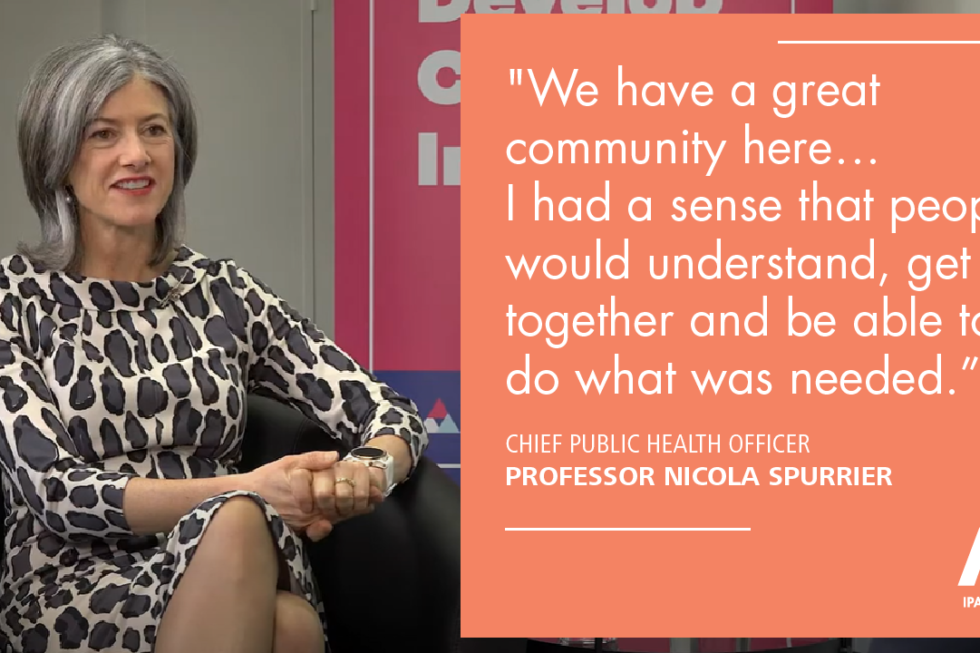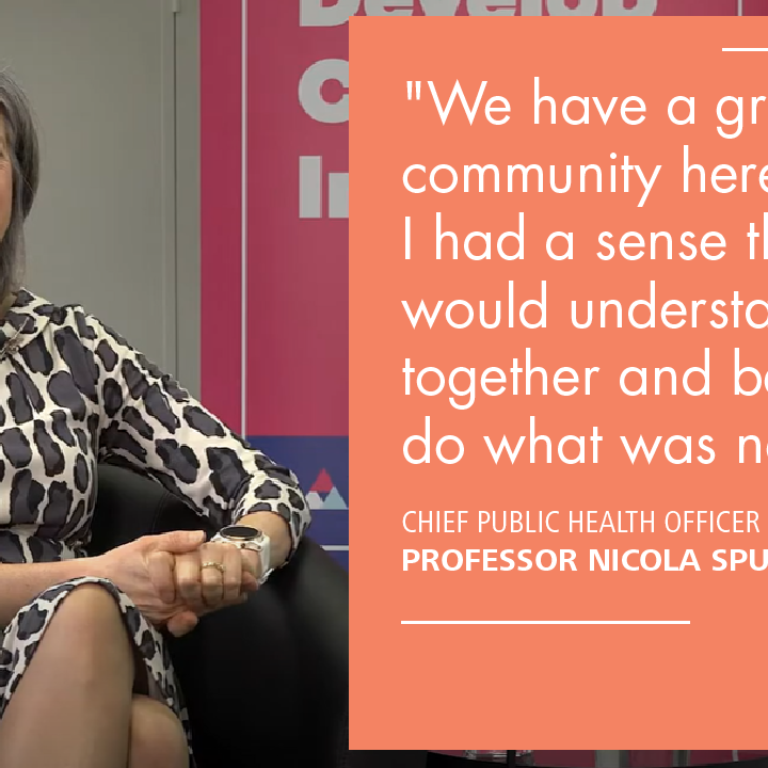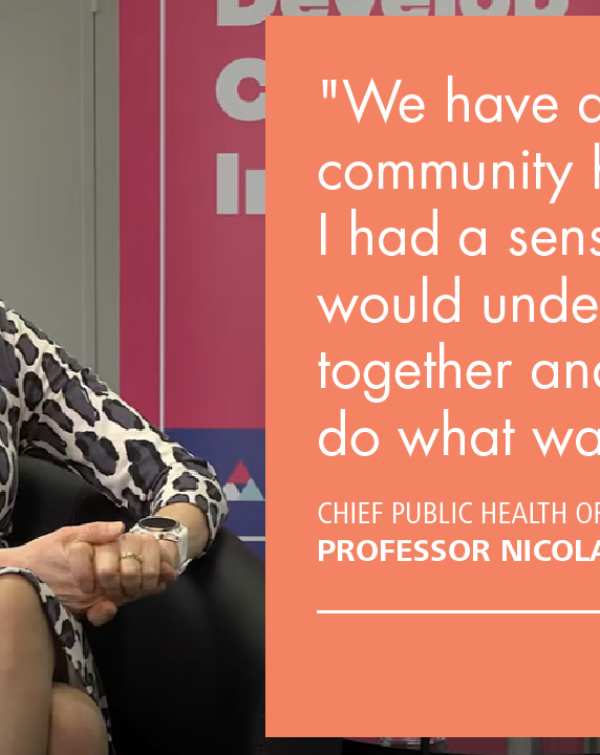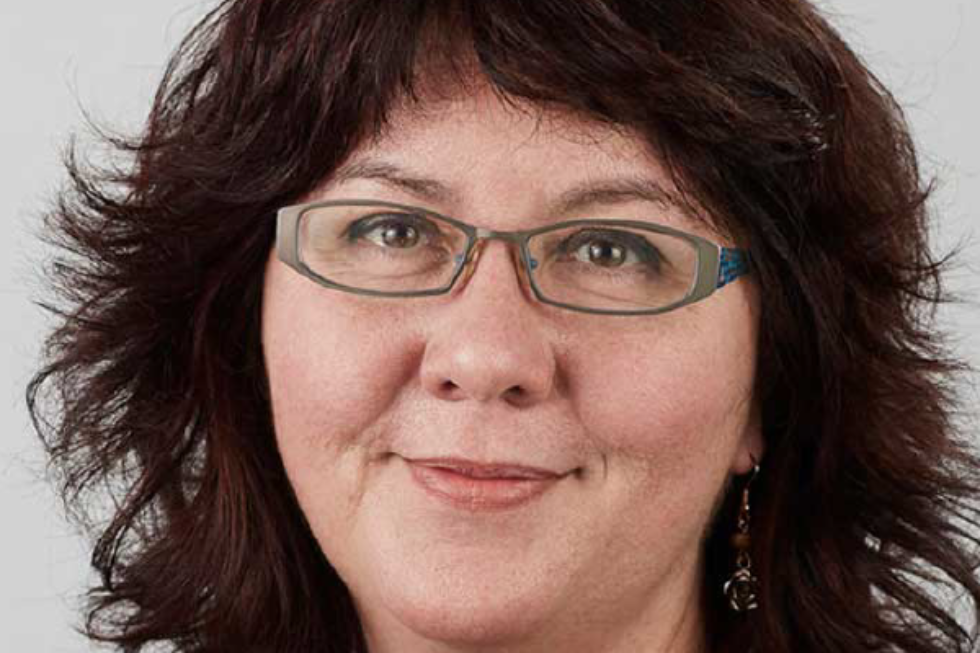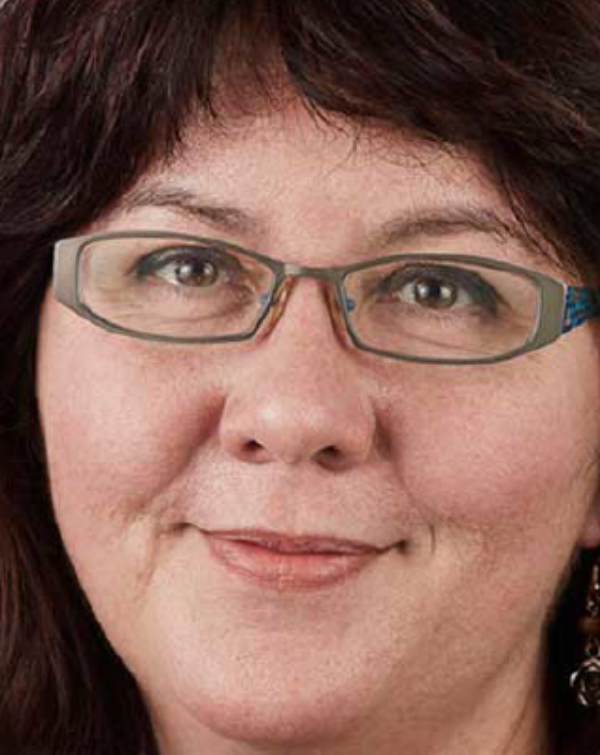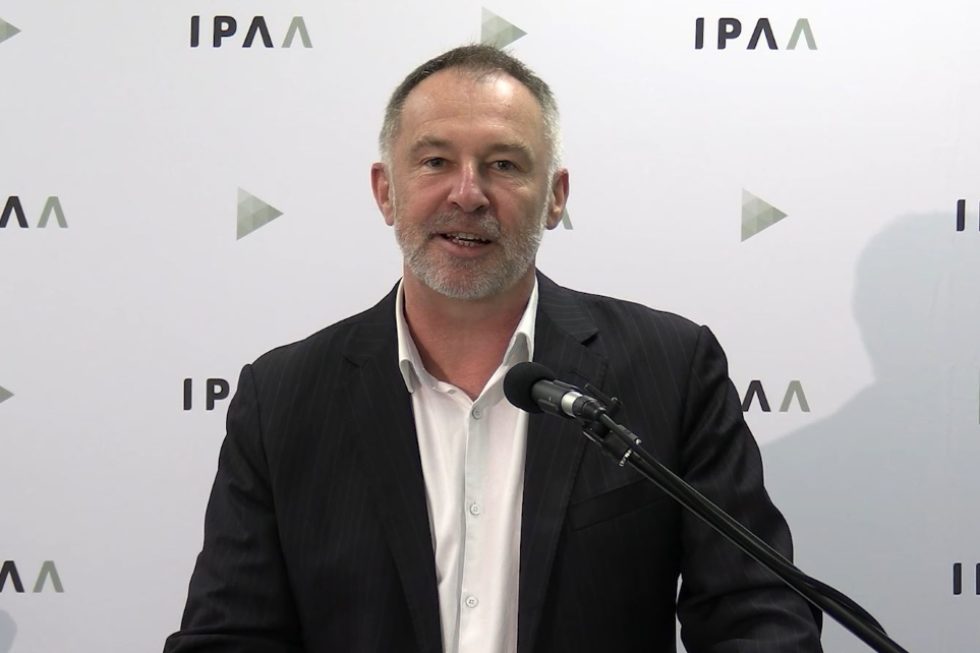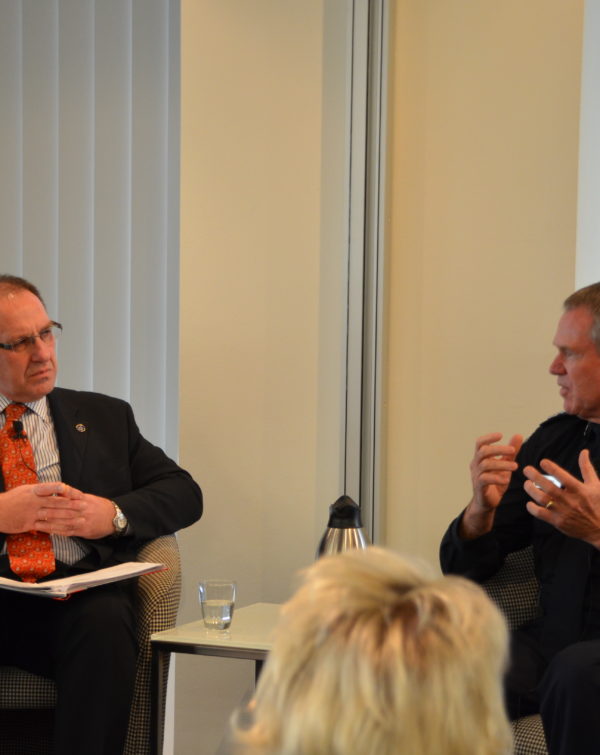When so much of what we have taken for granted has shifted, many of us are experiencing the challenge of seeing our purpose through our work. The role of public servants has never been more vital, though the way in which we work, has changed for many, and with this you may find that you lack the motivation and sense of purpose that you once had. IPAA ACT has launched a new podcast series called Working With Purpose, where during each episode they sit down with a prominent federal or state government leader to explore their key insights on this area. You can see a full list of the currently available podcasts below. Be sure to check back here each fortnight for the release of the latest episode!
EP# 1: COVID-19 response accelerating reform of the Australian Public Service with Peter Woolcott AO and Katherine Jones PSM | 6 April 2020
Join us for a discussion with Peter and Katherine, who reflect on their respective roles in the COVID-19 response. Peter shares with us some commentary around the APS Workforce Management Taskforce and Katherine reflects on the role of the Chief Operating Officer Committee.
EP#2: Relationships Matter with Andrew Metcalfe AO | 15 April 2020
In the second episode of ‘Work with Purpose’, we sit down with Secretary of the Department of Agriculture, Water and the Environment, Andrew Metcalfe AO. In this wide ranging conversation, Andrew speaks of his love of Italy, the importance of staying rested and fresh, collaboration with Industry and the inspiration he gets every day from working with his fellow public servants on this major crisis.
EP#3: The New Normal with Elizabeth Kelly PSM | 20 April 2020
In our third episode, we sit down via Zoom with Elizabeth Kelly PSM, Deputy Secretary at the Department of Industry, Science, Energy and Resources. In this podcast Elizabeth speaks about her role leading four COVID-19 task forces, finding creative solutions for sourcing PPE equipment, returning to the “next normal”, and more.
EP#4: Citizens First with Kathryn Campbell AO CSC | 28 April 2020
Kathryn Campbell AO CSC, Secretary of the Department of Social Services (DSS), gives her insights into the DSS COVID response, including the increased workload and workforce surge, and what makes her proud to be part of the APS.
EP#5: Making Good Decisions in a Time of Overload with Frances Adamson | 4 May 2020
In this episode, which has been produced as both a podcast and a video, we are joined by Frances Adamson, Secretary of the Department of Foreign Affairs and Trade. We are also joined by Holly Noble as co-host, who is Chair of IPAA’s Future Leaders Committee and a Director at the Department of Finance.
EP#6: Communicate, Communicate, Communicate with Cheryl-anne Moy | 12 May 2020
Cheryl-anne Moy, Deputy Secretary and Chief Operating Oiffcer at the Department of Home Affairs, shares personal reflections and learnings from the public sector’s, and her team’s response to COVID-19.
EP#7: Small is Beautiful with Rebecca Cross and Katy Haire | 18 May 2020
Rebecca Cross, the ACT Coordinator-General for the COVID-19 Response, and Katy Haire, Director-General at the ACT Education Directorate, discuss the links between public service and business, the ACT government’s priorities during the pandemic and working as one government.
EP#8: Defence – Here to help with Greg Moriarty and General Angus Campbell AO DSC | 25 May 2020
Greg Moriarty, Secretary of the Department of Defence, and General Angus Campbell AO DSC, Chief of the Australian Defence Force, discuss how the collaborative business model developed during the bushfire crisis has shaped Defence’s contribution to the COVID-19 pandemic, and into the future.
EP#9: Fighting crime during COVID-19 with Reece Kershaw APM and Michael Outram APM | 2 June 2020
Reece Kershaw APM, Commissioner of the Australian Federal Police, Michael Outram APM, Commissioner of the Australian Border Force, talk about the challenges of enforcing values and meeting community expectations, and what they have done to minimise the impact of criminals in Australia and from overseas.
SPECIAL EPISODE: Work with Purpose – A National Perspective with Chris Eccles AO | 5 June 2020
In this special episode IPAA’s National President Dr Gordon de Brouwer PSM, sits down with Chris Eccles AO, Secretary of the Department of Premier and Cabinet, to discuss how the Victorian government has led the state through crisis to recovery.
EP#10: How ASIO managed during a major global health crisis with Mike Burgess | 9 June 2020
Mike Burgess, Director-General of Security at the Australian Security Intelligence Organisation, joins us to discuss how the work of ASIO changed during the COVID-19 pandemic.
EP#11: The dynamic duo with Professor Brendan Murphy and Caroline Edwards | 15 June 2020
This episode features the tireless leaders of ‘Team Health’ in a remarkable discussion that covers their personal and professional experiences and insights during the COVID-19 crisis: Professor Brendan Murphy, the Chief Medical Officer and Caroline Edwards, the acting Secretary of the Department of Health.
EP#12: Doing the basics well with Michael Manthorpe PSM, Grant Hehir and Angelene Falk | 22 June 2020
In this episode we speak with three APS leaders about the importance of integrity and its impact on citizens: Michael Manthorpe PSM, the Commonwealth Ombudsman, Grant Hehir, the Auditor-General of Australia, and Angelene Falk, the Australian Information Commissioner and Privacy Commissioner. Listen here.
EP#13: Need drives innovation with David Fredericks PSM and Dr Michele Bruniges AM | 29 June 202
David Fredericks PSM, Secretary of the Department of Industry, Science, Energy and Resources, and Dr Michele Bruniges AM, Secretary of the Department of Education, Skills and Employment, reflect on the power of collective work and reaching out to colleagues in an open and transparent way. Listen and watch here.
EP#14: Food for thought with Ray Griggs AO CSC and Letitia Hope | 6 July 2020
In this episode we speak with the leaders of the National Indigenous Australians Agency, Chief Executive Officer Ray Griggs AO CSC, and Deputy Chief Executive Officer Letitia Hope. We explore the decisions, partnerships and networks that were deployed to keep the people in, and the virus out, of our most remote communities. Listen here.
EP#15: Under Pressure – Rebecca Skinner | 13 July 2020
In this week’s Work with Purpose, Rebecca Skinner, Chief Executive Officer of Services Australia, shares her memories of the earliest days of the COVID-19 crisis and how she prepared her team to not just cope, but thrive. She reflects on the importance of sharing the load, taking it one day at a time and always remembering that no matter how bad things looked, the sun would always rise the next morning. Listen here.
EP#16: Road to recovery with Jane Halton AO PSM | 20 July 2020
Our guest for this episode is Jane Halton AO PSM, Commissioner at the National COVID-19 Coordination Commission. During her 33 years in the Australian Public Service, Jane served for 15 years as Secretary of the Departments of Finance and Health (and Ageing); as well as Chair of the Bill and Melinda Gates Foundation’s Coalition for Epidemic Preparedness Innovations, and has held significant roles in Global Health Governance including as Chair of the board of the World Health Organisation.
EP#17: Oceans-19 with Michael Pezzullo AO | 27 July 2020
In this episode we’re joined by Michael Pezzullo AO, Secretary of the Department of Home Affairs, who recalls how by age 11 he had already decided on a career of public service, describes the inspiration he gets from working with our political leaders, and his desire to leave the APS in a better place than when he started.
A SPECIAL EPISODE: Work with Purpose – A National Perspective with Sharyn O’Neill | 3 August 2020
In this special episode of ‘Work with Purpose – A National Perspective’ IPAA National President, Dr Gordon de Brouwer PSM, is joined by WA Public Sector Commissioner and State Recovery Controller, Sharyn O’Neill, who shares her experience and insights on Western Australia’s COIVD-19 response and recovery.
EP#18: Future Leaders with Katherine Jones PSM – The APS in 2021 | 10 August 2020
This episode features a conversation with Katherine Jones PSM, the Associate Secretary of the Department of Defence, Matt McMahon, the Assistant Commissioner at the Australian Electoral Commission, and IPAA Future Leaders who undertook a hackathon to explore the question “What could, or should the APS look like one year from now?”
EP#19: Keeping it Simple with Chris Jordan AO | 17 August 2020
In this episode, we speak with Chris Jordan AO who has driven major change in the Australian Taxation Office (ATO) since assuming the position of Commissioner in 2013. In Chris’ view, the cultural “reinvention’’ of the ATO over the past seven years has prepared the organisation to deal with the challenges of COVID-19.
A SPECIAL EPISODE: Work with Purpose – A National Perspective with Dave Stewart | 20 August 2020
In this special episode, Dave Stewart, Director-General of the Department of the Premier and Cabinet of the Queensland Government, talks about how the public service has come together to support the Premier, Cabinet and Ministers in managing the COVID-19 health and economic crises.
EP#20: Let’s Stick Together with Steve Worrall and Dr Larry Marshall | 24 August 2020
In this episode, which was recorded during National Science Week, we bring together Steve Worrall, Managing Director of Microsoft Australia and Dr Larry Marshall, Chief Executive at CSIRO, who have been working in Australia’s best interests since well before the beginning of the pandemic.
A SPECIAL EPISODE: Work with Purpose – A National Perspective with Erma Ranieri | 27 August 2020
In this special episode, Erma Ranieri, the Commissioner for Public Sector Employment, South Australian Government, talks about how the South Australian public service has responded to the pandemic and is working to strengthen the resilience of its workforce.
EP#21: ‘Parliament powers on’ with Rob Stefanic and Cate Saunders | 31 August 2020
In this episode we speak with the Secretary of the Department of Parliamentary Services, Rob Stefanic, and Deputy Secretary Cate Saunders, about how their team joined in the APS whole-of-government effort to help the Australian people.
EP#22: ‘A Purpose-driven public service’ with Philip Gaetjens and Eleanor Kay | 14 September 2020
Philip Gaetjens, Secretary of the Department of the Prime Minister and Cabinet (PM&C) talks about how the collaboration across federal, state and territory lines is heightened, and is set to continue as the APS looks to strengthen its culture of communications and data sharing to support effective service delivery. Philip is joined by PM&C Graduate, Eleanor Kay.
EP#23: ‘Keeping up with JobKeeper’ with Dr Steven Kennedy PSM and Matt Comyn | 21 September 2020
In this unmissable episode, Dr Steven Kennedy PSM, Secretary of The Treasury, and Matt Comyn, CEO of the Commonwealth Bank of Australia, is joined in conversation with Jessica Irvine, the Senior Economics Writer for The Sydney Morning Herald and The Age.
EP#24: ‘Last Drinks’ with Drew Baker, Caroline Walsh and Carmel McGregor PSM | 28 September 2020
Drew Baker’s transformative term as Chief Executive Officer of IPAA ACT, was one of energy, strategy and opportunism. After more than five years in the role, he left the organisation in great hands, with a capable new CEO excited to take IPAA from strength to strength. In this episode, Drew is joined by his successor Caroline Walsh, and Carmel McGregor PSM, former IPAA ACT Deputy President and former Deputy Secretary.
EP#25: ‘Australia’s Bright Future’ with Andy Penn | 6 October 2020
The ways we work have changed drastically, yet according to Telstra Chief Executive Officer, Andy Penn, it’s only just getting started. Australians have adopted digital technologies at an unprecedented pace during COVID-19. This has delivered benefits including mitigating skills shortages, improved work-life balance and increased workforce satisfaction. In this episode, Andy speaks about how Australia is well placed to capture a bright digital future.
EP#26: ‘Making the Lives of Australian Citizens Easier’ with Ailsa Borwick, Jason Lucchese and Helen Bailey | 12 October 2020
How do you cut a government form down from 164 questions to 10 without losing the rigour? How can you leverage existing business information systems to take the hassle out of payroll and superannuation guarantees? In this episode we hear from Helen Bailey, Manager of the Public Sector Innovation Network, and 2020 Public Sector Innovation Award winner representatives, Ailsa Borwick from Services Australia and Jason Lucchese from the ATO.
EP#27: ‘Strong Teams, Strong Institutions’ with Rosemary Huxtable PSM and Chris Moraitis PSM | 19 October 2020
In this episode we are joined by Rosemary Huxtable PSM, Secretary of the Department of Finance and Chris Moraitis PSM, Secretary of the Attorney-General’s Department. From their unique perspectives leading the teams that underpin much of Government services, they talk candidly about the challenges of navigating uncertain times, and share their pride in the strength of their people and the institutions they support.
A SPECIAL EPISODE: Work with Purpose – Global Perspectives: ‘An Extraordinary APS’ with the Australian Centre for International Agricultural Research | 26 October 2020
Hear about some of the extraordinary projects the Australian Centre for International Agricultural Research (ACIAR) are leading, in partnership with academia, industry and international governments, to improve the lives and livelihoods of developing communities across the globe, as well as back home in Australia.
EP#28: ‘A year of Looking Back and Moving Forward’ with Dr Marie-Louise Ayres, Dr Mathew Trinca AM and Dr Rachael Coghlan | 5 November 2020
As COVID-19 changes the rules of access, how do our cultural institutions remain vibrant, relevant, and resilient? In this special episode of Work with Purpose, leaders from three of Australia’s best-loved institutions describe how they, and their teams, met the challenge.
EP#29: ‘National Service, Individual Purpose’ with Liz Cosson AM CSC | 9 November 2020
The first female Major General of the Australian Army, and now Secretary of the Department of Veterans’ Affairs, Liz Cosson AM CSC, has devoted her career to serving the nation and its people. She shares her insights in this episode.
EP#30: ‘Workplace health and safety: A common sense approach’ with Sandra Parker PSM and Sue Weston PSM | 23 November 2020
With each state and territory having such different COVID-19 pandemic experiences, how do you support all Australian businesses to keep operating? In this episode we hear from the leaders of two of Australia’s key workplace regulatory authorities: Sandra Parker PSM, the Fair Work Ombudsman, and Sue Weston PSM, CEO of Comcare.
A SPECIAL EPISODE: A National Perspective: ‘A well-earned tipping point’ with Jodie Ryan | 3 December 2020
Jodie Ryan, Chief Executive of the Northern Territory Government’s Department of the Chief Minister and Cabinet, believes that the COVID-19 crisis has brought the territory to a positive tipping point. The investment in their response – including relationships built, new ways of doing things, risks taken and lessons learnt – will help to cast a more effective NT public service that better serves its citizens.
EP#31: ‘Trust in Government after 2020: Where do we go from here?’ with Professor Mark Evans and Michelle Grattan AO | 7 December 2020
Trust in the Commonwealth Government rose to new heights during the COVID-19 pandemic. In this special episode of Work with Purpose, Director of Democracy 2025, Professor Mark Evans FIPAA, and one of Australia’s most distinguished political journalists, Michelle Grattan AO, explore this increase in political trust and how trust levels could be shaped in the future.



